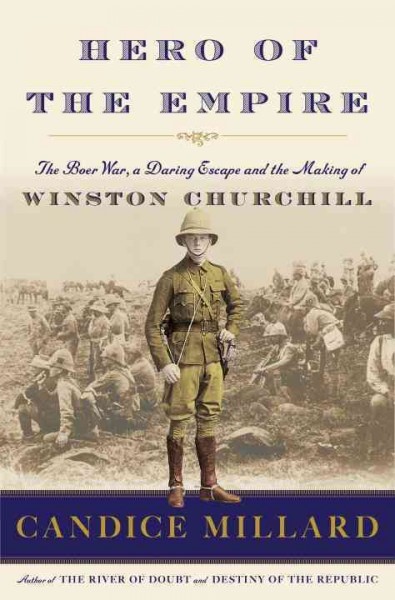By Jim Ewing. Special to The Clarion-Ledger.
Embedded in America’s consciousness is the picture of a rotund, cigar-chomping Winston Churchill, grimly resolving to fight the Nazis on land, sea and air during the darkest days of World War II.
 With Candice Millard’s latest biography Hero of the Empire, Churchill’s image could well be shattered to superimpose a portrait of him as a young and daring adventurer.
With Candice Millard’s latest biography Hero of the Empire, Churchill’s image could well be shattered to superimpose a portrait of him as a young and daring adventurer.
Subtitled “The Boer War, a Daring Escape and the Making of Winston Churchill,” Millard’s biography zeroes in on Churchill when he was 24. Itching to go to war, the descendant of the 1st Duke of Marlborough and privileged friend to the Prince of Wales was desperate to prove himself on the battlefield.
No stranger to bloodshed even at this young age, the young aristocrat already had taken part in wars on three continents — Cuba, British India and the Sudan. But the Boer War in South Africa would thrust him on the world stage.
“Hero” chronicles his fighting as a supposed noncombatant journalist, his capture as a prisoner of war, and his grueling escape from behind enemy lines that captivated a nation.
Churchill, as “Hero” reveals, was larger than life and a study in contrasts. Impulsive, opinionated, an “opportunist, braggart and blowhard,” he also proved fearless, brave, heroic and forgiving of others, including former foes.
Churchill is known for his oratory, but few may recall that he first made his mark as a writer. Indeed, contemporary author Sir Arthur Conan Doyle, who created Sherlock Holmes, called Churchill “the greatest living master of English prose.”
Hero is punctuated by fascinating details. For example, Churchill’s American mother was of Native American descent and of such dazzling beauty that literally thousands would attend any event where they could catch a glimpse of her. Churchill, the book relates, sought to hide a speech impediment (difficulty with the letter s) his entire life.
Situated in 1899, the Boer War does not meet much historical attention, stuck as it is between the American Civil War and the World Wars. But “Hero” deftly explains its importance to the past, present and future.
The Boers were farmers and didn’t fight in orderly fashion, but hid behind every rock and shrub. Before them was amassed the greatest fighting force the world had ever known — the mighty British Empire. The fighting scenes are enthralling as the immovable object of hidden and entrenched Boers fighting for their adopted homeland meet the irresistible force of the British Army.
But, again in contrast, Churchill’s escape is aided in part by the fact that the white Boers despised the black native majority they ruled, which sided with the British who had helped ban slavery on the continent. The parallels between the Civil War, the fortunes of empires, and the rise of mechanistic death over previously accepted rules of war as would rend the globe in years to come are absorbing.
Within the grand sweep of this bloody milieu, the harrowing tale of a young journalist hiding in ditches and boarding boxcars under cover of night, provides a saga of such magnitude as to be astounding in its scope. Major motion picture material here!
Meticulously documented with nearly 40 pages of notes, Hero is a gripping read, rivaling the finest fiction. Except, if it were fiction, no one would believe it — or that its improbable hero would come to be known as Britain’s iconic leader.
Jim Ewing, a former writer and editor at The Clarion-Ledger, is the author of seven books including Redefining Manhood: A Guide for Men and Those Who Love Them, now in bookstores.
Candice Millard will be here on Tuesday, October 11 at 5:00 to sign the October 2016 First Edition Club selection, Hero of the Empire.


Comments are closed.